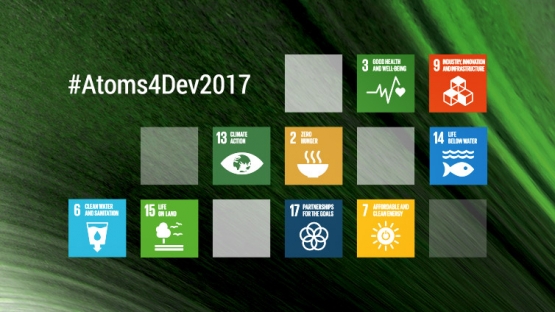The IAEA and its partners will showcase the achievements and impact of technical cooperation over the last six decades and explore strengthened partnerships with and among Member States, United Nations organizations, financial institutions and the private sector at the first ever conference on the IAEA technical cooperation programme starting tomorrow. The conference, entitled Sixty Years and Beyond – Contributing to Development will draw officials from 150 countries, including ministers and heads of state.
“The IAEA, with decades of experience in building capacity in nuclear science and technology for development, has the knowledge and delivery mechanism to complement and contribute to the crucial work of its partners,” said Dazhu Yang, IAEA Deputy Director General and Head of the Department of Technical Cooperation. “Experience has taught us that shared responsibility and partnerships are essential if we are to effectively help countries use nuclear science and technology to overcome development challenges and achieve a lasting impact.”
Around 1200 participants will gather at IAEA Headquarters in Vienna, including President of Uruguay Tabaré Vázquez, President of Mauritius Ameenah Gurib-Fakim, and Prime Minister of Bangladesh Sheikh Hasina Wazed.
The three-day conference will show how the peaceful application of nuclear science and technology can help countries meet their development priorities. Beneficiaries from all regions of the world will share the impact the technical cooperation programme is making in health, nutrition, food security, clean water, the environment, industry, energy planning, nuclear power infrastructure, radiation and nuclear safety. After each session, panellists will discuss concrete examples and examine future approaches, including partnership opportunities, to applying nuclear science and technology for development.
The conference will also showcase how the IAEA’s technical cooperation programme can contribute to the achievement of the United Nations Sustainable Development Goals (SDGs). “Achieving the SDGs is not a task that any organization can undertake in isolation,” Yang said. “Collaboration is needed at all levels to increase access to science, technology and innovation.”
Read these Impact stories, the latest addition of the IAEA Bulletin or check this brochure to learn more about how the IAEA supports the SDGs.
Another objective of the conference is to reach out to other international organizations and private sector partners in the development world, and to demonstrate to them the benefits of working in partnership with the IAEA. For example, a side event will explore how public-private partnerships can further benefit countries and increase access to nuclear science and technology as a part of the Agenda 2030.
“Through partnerships between the IAEA, other organizations and Member States, we can ensure that the benefits of applied nuclear science and technology will reach the people who need them most, and that we put our best efforts forward for human well-being, global sustainability and resilience,” Yang said.
The IAEA’s Technical Cooperation Programme
The technical cooperation programme is the primary mechanism for delivering IAEA development assistance to Member States. It builds national capacity in the peaceful application of nuclear science and technology and helps countries develop the relevant infrastructure. The programme also facilitates networking and knowledge sharing and, very importantly, the fostering of suitable development partnerships at all levels. The main tool employed by the technical cooperation programme is the provision of training and expertise, and procurement. Since its inception in 1957, the Programme has trained more than 48,000 scientists and engineers through fellowships and scientific visits. Today, around 900 projects are active around the world.
The programme’s strategic aim is to create tangible socioeconomic impact by contributing to the achievement of the major sustainable development priorities of a country. The programme is guided by requests for assistance from Member States, in accordance with national priorities, and provides guidance to Member States on the best way to address their needs using nuclear technology.
For more information about the International Conference on the IAEA Technical Cooperation Programme: Sixty Years and Beyond – Contributing to Development, click here.
Or follow our livestream here.






